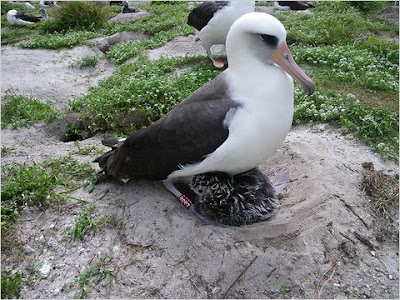
photo courtesy of USGS
I know, an albatross is about as far away as you can get from a grassland bird, but this is a bird story I could not resist posting.
A week ago, Stuart Houston sent me an email about a Laysan albatross that banding records prove to be the oldest known wild bird in the world. Stuart has inspired a lot of people to take their passion for nature seriously and it was his suggestion that led me to write Grass, Sky, Song in the first place. As an elder statesman of the ornithological world, he keeps in touch with some of the great bird men and women of his generation all over the planet. The email about the albatross was in fact addressed to Chandler S. Robbins, who is one of the greatest bird conservation biologists of our era. Robbins worked for the US Geological Survey for sixty years at the USGS Patuxent Wildlife Research Center in Laurel, Maryland.
This is the man who started the continent's most important bird census, the Breeding Bird Survey, back in the '60s. Without the BBS, we would not have the data to show that bird populations and distribution are changing. Writers and bird people like me rely on the BBS to bring the story to the public.
Robbins was also the bird conservationist who saw to it that Rachel Carson's work would not go in vain. In 1972, an effort led by Chandler Robbins succeeded in getting DDT banned in the United States.
He also wrote one of the most important field guides of the modern era, The Golden Guide's Birds of North America. Covering the entire continent in a small book easily kept in the pocket, this guide has been a favourite of birders for fifty years and has never gone out of print.

image of Chan Robbins courtesy of USGS
But back to the albatrosss. What is the connection between the sixty year old albatross and Chan Robbins?
Stuart knew it the moment he saw the article in the New York Times.
In the email to Chan, Stuart says
An Albatross sixty years old has a high chance of having been banded by that indefatigable and almost indestructible Chandler S.Robbins.
He was right of course. The world's most venerable bird was banded by the world's most venerable living bird bander and conservationist. Chan Robbins banded that albatross as a nestling in 1951. The bird is now 60 and still producing young. Chan is 92 years old and still working on behalf of birds.
The albatross, named Wisdom by USGS staff years ago, is nesting on Midway Atoll in the Pacific between Hawaii and Japan. As we all know, the earthquake last week send tsunami waves washing onto islands all over that region of the pacific. Midway Atoll is a very low island and the nests of the albatrosses who depend on it would be most vulnerable to high waves. On March 11, shortly after the quake, a five foot high wave hit the island destroying thousands of nests.
Today, I received this astounding message in my email from none other than the grand old man himself:
Late word from Midway is that "Wisdom" and her chick survived the tsunami, although thousands of other chicks were washed away.
Chan
Chandler S. Robbins
USGS Patuxent Wildlife Research Center
Sure, I was just one of the people in the cc field of the email when he responded to Stuart, but it was a thrill to see the name "Chandler S. Robbins" sitting in my in-basket this morning.
The sixty-year old albatross and her chick live through a tsunami, and the news comes from the ancient one who knew her when she was herself a nestling. Meanwhile the world waits to hear what will happen to the people of Japan, with another earthquake expected and several nuclear reactors out of control.
It all feels like a strange resolution to Coleridge's great Rime:
Farewell, farewell! but this I tell
To thee, thou Wedding-Guest!
He prayeth well, who loveth well
Both man and bird and beast.
He prayeth best, who loveth best
All things both great and small;
For the dear God who loveth us,
He made and loveth all."
The Mariner, whose eye is bright,
Whose beard with age is hoar,
Is gone; and now the Wedding-Guest
Turned from the bridegroom's door.
He went like one that hath been stunned,
And is of sense forlorn:
A sadder and a wiser man
He rose the morrow morn.





No comments:
Post a Comment